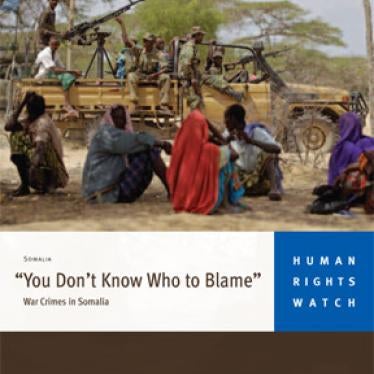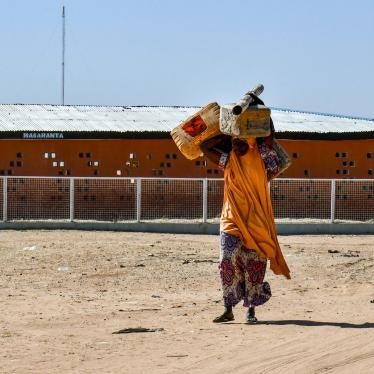(Nairobi) – All parties to Somalia’s armed conflict have committed serious violations of the laws of war that are contributing to the country’s humanitarian catastrophe, Human Rights Watch said in a report released today. All sides should immediately end abuses against civilians, hold those responsible to account, and ensure access to aid and free movement of people fleeing conflict and drought.
The 58-page report, “‘You Don’t Know Who to Blame’: War Crimes in Somalia,” documents numerous abuses during renewed fighting in the past year by parties to the 20-year-long conflict in Somalia. These include the Islamist armed group al-Shabaab, the Somali Transitional Federal Government (TFG), the African Union peacekeeping forces (AMISOM), and Kenya- and Ethiopia-backed Somali militias. The report also examines abuses by the Kenyan police and crimes committed by bandits in neighboring Kenya against Somali refugees.
“Abuses by al-Shabaab and pro-government forces have vastly multiplied the suffering from Somalia’s famine,” said Daniel Bekele, Africa director at Human Rights Watch, “All sides need to take urgent steps to stop these unlawful attacks, let in aid, and end this humanitarian nightmare.”
The report, based on interviews with recently arrived Somali refugees in Kenya and other sources, examines two major TFG offensives against al-Shabaab since September 2010. Civilians have borne the brunt of the fighting, Human Rights Watch said.
All sides have used artillery in the capital, Mogadishu, in an unlawful manner that has caused civilian casualties. Al-Shabaab has fired mortars indiscriminately from densely populated areas, and the TFG and AMISOM forces have often responded in kind with indiscriminate counterattacks. As a result, civilians have not known where to turn for protection. While al-Shabaab’s reported withdrawal from Mogadishu may bring some respite to civilians in the capital from the incessant fighting, future abuses are likely unless the warring parties take assertive measures to end them, Human Rights Watch said.
“Both sides don’t spare the public,” a woman who had fled Mogadishu told Human Rights Watch. “Sometimes it happens that the person you had breakfast with in the morning is killed by mortars in the afternoon.
Somalis also described to Human Rights Watch unrelenting daily repression and brutality in areas under al-Shabaab control. Harsh punishments, notably floggings and summary executions, including public beheadings, are common and meted out against those who violate the militants’ oppressive laws or who are accused of being traitors. Al-Shabaab forcibly recruits children and adults into its forces. It deprives inhabitants under its rule of badly needed humanitarian assistance, including food and water, and prevents people from fleeing to safer areas.
The TFG has largely failed to provide basic security and human rights protections in the limited areas under its control, Human Rights Watch said. It and its allied militias have committed serious rights violations, including widespread arbitrary arrest and detention, restrictions on free speech and assembly, and indiscriminate attacks harming civilians.
Involvement by outside actors in Somalia has often been counterproductive and contributed to ongoing security threats. The United States, European Union, and United Nations provide support for the TFG without making a meaningful effort to press its leaders to curtail abuses. With only one year left in the TFG’s mandate, its international supporters should ensure that clear human rights benchmarks are established and achieved – including to improve accountability. If the transitional government does not achieve these basic objectives, other governments and the United Nations should reconsider their support, Human Rights Watch said.
AMISOM has in recent months taken measures to minimize civilian casualties during military operations. However, grave violations by its forces persist and the soldiers responsible have largely not been held to account.
Ethiopia and Kenya are parties to the conflict, having deployed units of their armed forces in military operations in southern Somalia in 2011. They have also provided military assistance to militias supporting the TFG. Yet neither Ethiopia nor Kenya has acted to ensure accountability for abuses by their troops or by the militias they support.
Human Rights Watch repeated its call for a UN commission of inquiry to investigate violations of human rights and the laws of war by all sides since the beginning of the conflict and to lay the groundwork for accountability. Human Rights Watch urged all parties to the conflict in Somalia to take concrete steps to protect civilians – notably respecting basic measures aimed at protecting civilians during attacks – and ensuring that humanitarian access is facilitated at all times.
“There is no quick fix to Somalia’s tragedy, but it’s clear that impunity for serious abuses perpetuates insecurity,” Bekele said. “International pressure to bring an end to abuses by all sides is more crucial than ever – a more secure and rights respecting Somalia would be less prone to violence and famine.”
Escalation in fighting has resulted in massive displacement of the population in Mogadishu, as well as from the border regions. An area along the Kenyan border referred to as “Jubaland” has been particularly affected, with the Kenyan government indicating it wants to convert the area into a buffer zone between its territory and al-Shabaab-controlled areas. Kenyan ministers have called for Somalis to be assisted inside this “buffer zone,” instead of in Kenya, claiming that the area is safe. However, the area remains highly insecure and unstable.
Kenya has long been the host for several hundred thousand Somali refugees, a huge burden that has increased in the past year. Fighting and drought have driven hundreds of thousands of Somalis from their homes in 2011, including over 100,000 who have crossed into Kenya.
Somali refugees face serious challenges in Kenya, Human Rights Watch said. The journey to the Dadaab refugee camps is perilous. Human Rights Watch research since 2010 has found that refugees face police extortion and violence, arbitrary arrest and detention, and unlawful deportation to Somalia, with deportations continuing well into 2011. Refugees told Human Rights Watch that they took hazardous back roads to avoid the Kenyan police, but had been robbed and raped by bandits along those roads.
As of July 24, the refugee camps at Dadaab, originally built for 90,000 people, had a registered refugee population of 390,000. Recently arrived Somali refugees face overcrowded and inhumane living conditions in the camps and registration delays in getting even minimal assistance.
The Ifo II extension camp is empty, and has been ready to shelter 40,000 refugees since November 2010, and should be used without delay. Human Rights Watch urged the Kenyan government – with significantly increased support from international donor governments – to make additional land available for camps. Human Rights Watch also renewed its call on the Kenyan government to open a new refugee screening center in the border town of Liboi to register new arrivals and then transport them safely to the camps.
“We encourage the international community to provide aid inside Somalia, as well as to refugees in Kenya and Ethiopia,” Bekele said. “Somalia’s neighbors need to respect the right of all those fleeing Somalia to seek asylum.”
Selected Testimony from “You Don’t Know Who to Blame”
A 37-year-old woman from Mogadishu who fled indiscriminate shelling:
Both sides don’t spare the public. Sometimes it happens that the person you had breakfast with in the morning is killed by mortars in the afternoon. Al-Shabaab is fond of firing weapons from residential areas, knowing very clearly that the other side is going to return fire to the same place. Then al-Shabaab runs away. And the TFG and AMISOM don’t care whether there are civilians or not in the places they fire on. You don’t know whom to blame – do you blame al-Shabaab for hiding among the public, or the government for hitting back at the same place from where they were fired on?
A 40-year-old woman from Mogadishu whose husband was taken into custody by al-Shabaab:
They called me themselves and said, ‘We are in possession of your husband, who is also an infidel, isn’t he?’ I said, ‘My husband is a Muslim.’ They said ‘He is an infidel and we will slaughter him.’ Two days after he was arrested they called me again. They told me we were infidels, our children were infidels, and to beware…. Their threats are still ringing in my ears.
A young man from Sakoh who fled an al-Shabaab-controlled area:
All our animals died. There are no camels anymore, no goats, no cattle, and even people started dying. There was no food because al-Shabaab would not allow the aid agencies to bring food. They say, ‘We don’t want the food of disbelievers.’
An elderly woman from Dhobley who was attacked on the way to Dadaab:
Three days ago I left Dhobley [by van]. We were robbed on the way. There were about 40 of us, and there were 10 men who came with their rifles and put them on our necks, and another 10 in the bush. Men and women were separated and we were told to give them mobile phones, money, whatever we had. Some of the girls were raped – about six of them. For me, they just put a gun to my neck and took my money and mobile phone, but I am an old person so I was not subjected to rape.
A middle-aged man who was arbitrarily detained by the TFG-aligned militia Ahlu Sunna Waj-Jama’a:
I myself was arrested and robbed by [Ahlu Sunna Wal Jama’a] officials. I was sitting somewhere in the town center in BulaHawo, and an explosion took place. A TFG government vehicle was destroyed by a mine. Immediately, the soldiers [from Ahlu Sunna Wal Jama’a] entered the town and started shooting carelessly. All of us were rounded up and taken to the police station. While I was being taken to the cell, the soldiers robbed my cell phone and 7,000 Ksh.
Five hundred of us were arrested. We were kept in a compound. Some were in a cell. Women were also arrested and were held separately. Some were carrying small children. The women and children were released the same day, but the men stayed in detention for two days.
After we were released, there was a public rally by the TFG government. They told us to do one of three things: either go to Kenya or Ethiopia, or go join those al-Shabaab people. [A district official] said “If something happens again here, you will be held responsible and we will kill you.” The day after the public rally we saw there was going to be no life there. We decided to take off.







